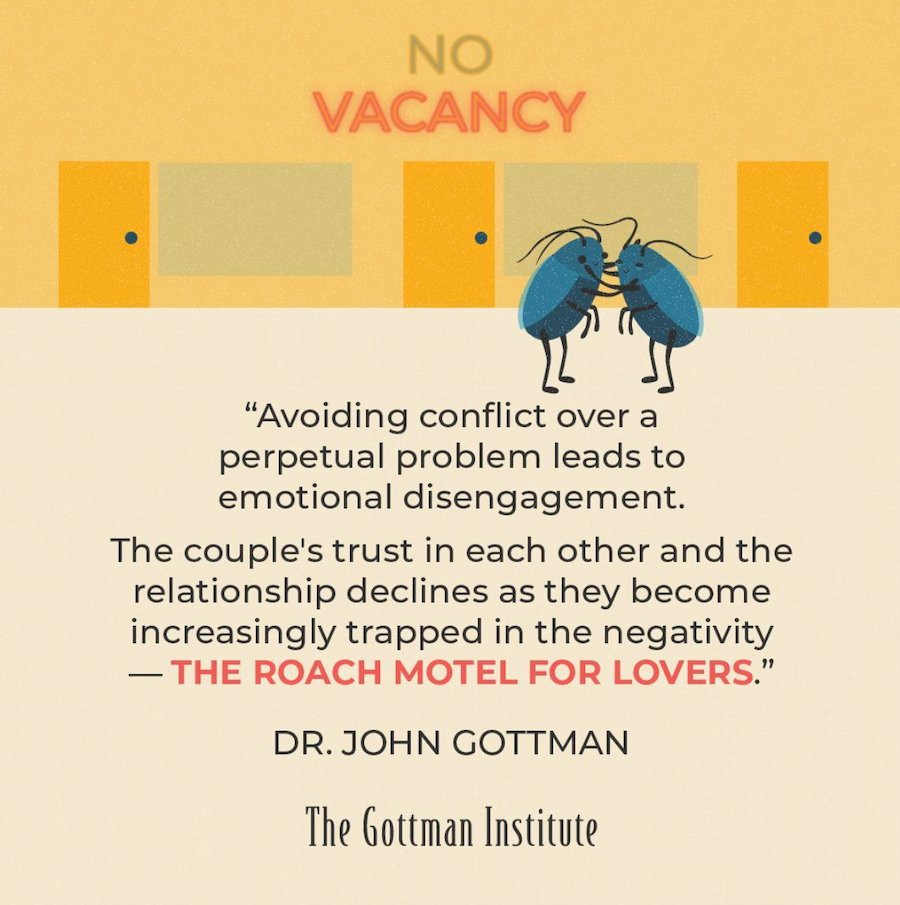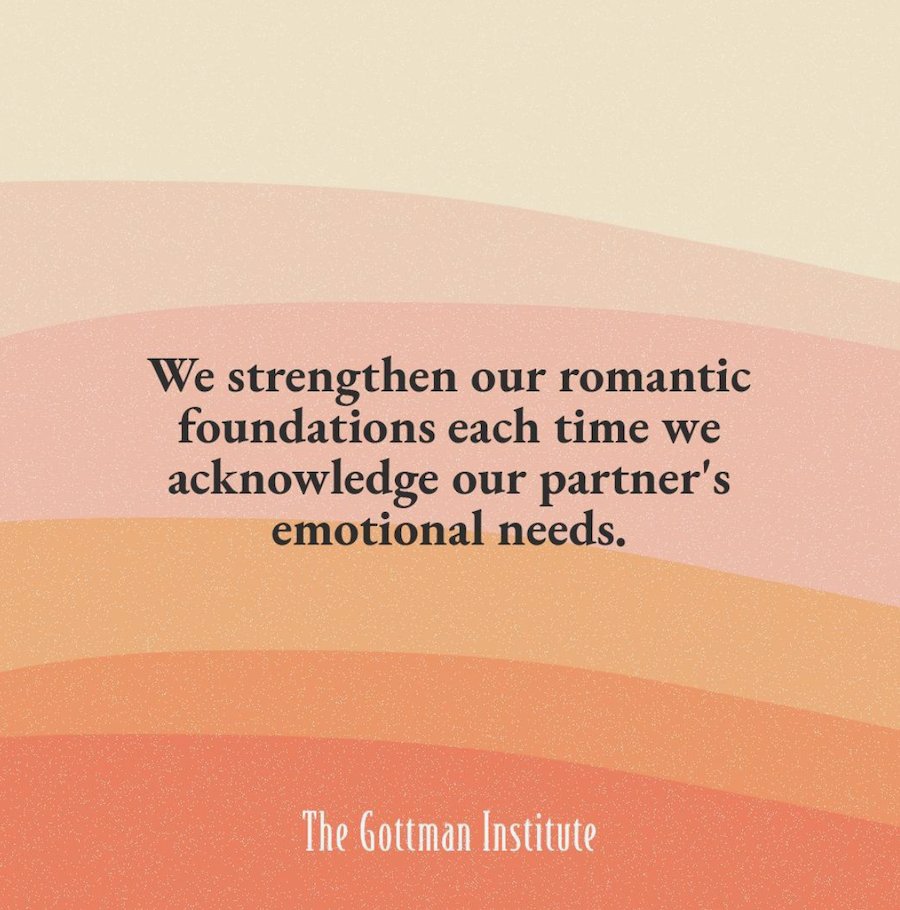There Are 5 Types Of Couples. Which One Are You?
by Stephanie Elliot
The Gottman Institute, led by Drs. John and Julie Gottman, has spent over 40 years studying couples and relationships to develop their own unique method of couples therapy. They can even predict, with 90% accuracy, which couples will get divorced, and which ones will stay together. Eek.
Dr. Gottman himself developed these five types of couples from his years of research and experience. But like any “type” of anything that tries to encapsulate the human experience into bite sized ideas, take all of this with a chunky grain of salt.
But on the other hand, when a couple spends their lives and livelihoods pursuing actionable ideas around the mysterious world of marriage that most of us are just flailing through, well, we listen.
Here are the 5 types:
Type 1: Conflict Avoiders
Yes. Conflict avoidance sounds, on the surface, a bit…passive aggressive. But according to the Gottman Institute, a conflict avoidant couple can still be close and stable and loving.
Aside from just avoiding conflicts, these couples also work to emphasize their shared interests and values. Because they feel their relationship is generally pretty happy, they don’t always express their needs and emotions, which can hamper this couple’s capacity for intimacy and real closeness.
Commonalities keep the marriage running smoothly but this couple also enjoys separate interests as well. Overall, their relationship is “good enough” for them.
Examples of a conflict-avoidant couple:
Saying things like, “we’re perfectly happy as we are, so why do we need therapy?”
Resentfully taking out the trash for the hundredth time because your partner never does it, instead of just kindly asking them to do a better job of remembering.
Avoiding your partner by spending more and more time at work or out with friends.
Walking out during a disagreement instead of facing it head-on.
Think Jim & Pam from The Office.
The Takeaway: While conflict-avoidant couples can be happy and independent, too much conflict avoidance can lead to resentment and attention-seeking behavior. It’s important for these couple types to become more comfortable communicating openly about their needs.
Type 2: Volatile Couples
It might surprise you that a “volatile” couple isn’t necessarily a bad thing, but according to The Gottman Institute, these couples can be quite happy.
This couple is very passionate and extremely emotional, the opposite of Conflict Avoiders. These spouses debate—they love to argue, and they love to win their arguments. But they do so with humor and amusement, creating a loving environment. Couples in this group usually don’t disrespect or insult, and while there is no contempt (more on this below) in this relationship, there are often no clear boundaries set.
Volatile Couples are connected and honest with one another, and when provoked or in conflict, laughter helps them work through it.
Examples of a volatile couple:
Fights that start off emotional, but then turn into teasing and laughter.
Shouting things like, “you’re not listening to me!” as you argue about who should win The Bachelor.
Heated, intellectual debates with each person trying desperately to persuade the other of their point.
Think Ross and Rachel. (They absolutely were on a break).
The Takeaway: While the debates and arguments are all in good fun, the lack of boundaries can be messy, and can lead to unhealthy enmeshment. So it’s important for these couples to start recognizing and adopting necessary boundaries.
Type 3: Validating Couples
A validating couple is a calm union. This couple supports and understands each other, and appreciates and shows empathy when hearing the other’s perspective on various topics.
Yes, there can be confrontation and conflict, but this couple picks their battles. When there is a dilemma or something important that needs to be addressed, this couple stays calm and validating toward one another.
Validating couples are only “mildly emotional,” and really try to support and understand one another.
Examples of a validating couple:
Actually saying things like, “you’re right” to your spouse.
Apologizing like an adult, and not saying, “I’m sorry you feel that way.”
Actively listening, without trying to problem-solve.
The takeaway: While this couple is great at supporting and understanding one another, they can also be stubborn, and become competitive during conflicts, so they need to work on compromising.
Type 4: Hostile Couples
Couples that blame one another and use the terms “you always” or “you never,” are considered “Hostile.”
Hostile Couples do not listen to or understand their partner’s perspective and they criticize often. This couple does not support one another, nor do they show interest in their partner’s point of view.
Research from The Gottman Institute’s Love Lab shows that most Hostile Couples will stay married, but unhappily so.
Examples of a Hostile Couple include:
Saying things like “my opinion matters the most” or thinking, “I’m always right.”
Being highly critical, and highly defensive.
Not wanting to admit to making mistakes.
Having the same fight, over and over.
The takeaway: These couples will keep a lid on their negativity and fighting just enough so that it doesn’t totally spiral out of control. But they are perpetually in conflict, and will stay married despite their unhappiness. These couples might need to work through their problems with a professional, who can help them access their own vulnerabilities, and take accountability for their behavior.
Type 5: Hostile-Detached Couples
It’s bad news for the Hostile-Detached Couple, as there is negative energy, frustration, loneliness, and feelings of detachment. This relationship can come to a stalemate, with neither partner willing to back down. According to research from the Love Lab, Hostile-Detached Couples usually end up in divorce.
Unhappy couples do not communicate well during conflict because they do any or all of the following: They criticize, show contempt for one another, can become defensive, or stonewall their partner.
The Gottman Institute describes these as The Four Horsemen:
Criticism: Frequent criticism doesn’t mean your relationship will fail. However, if this criticism causes rejection and hurt, and if a pattern continues, this could lead to contempt for one another, which is the next of the Four Horsemen.
Contempt: Unfortunately, this is when a partner is just really mean. If there is disrespect, ridicule, name calling, or mockery, this is contempt, and will make the other partner feel like he or she is worthless and hated. The Gottman Institute states that if a marriage is to survive, contempt must be eliminated in the relationship.
Defensiveness: If accused of something or criticized, a partner may become defensive. By playing victim, the person who is being defensive is protecting him or herself. Defensiveness is a way to reverse blame back to your partner.
Stonewalling: This is the act of shutting down or withdrawing, instead of engaging in a productive confrontation. Stonewalling can become a bad habit during conflict, and means that conflicts often aren’t resolved.
The takeaway: While this couple type can resemble that of the “hostile” couple, the biggest difference is that this couple doesn’t modulate their negativity, which is why they’re much more likely to divorce. And often, this couple has missed out on an essential phase of building their relationship: trust.
A few Gottman-approved methods to maintain a happy relationship:
No matter what “type” you are, these scientific tips can help any type of couple stay happy and connected, even in times of conflict:
Show interest: If your partner is upset or complaining about something, are you present and do you ask questions? Do you approach them with curiosity, or do you try to problem solve? Listen closely to what is being said, and give them your full attention.
Be affectionate: Even during conflict, it’s important to show affection, either physically or verbally. Sharing your feelings, a hug, or a kiss will connect you.
Prioritize your partner: The Gottman Institute’s motto for a lasting marriage is “small things often.” Letting your partner know that you’re thinking of him or her, and doing something thoughtful when unexpected, can enhance all the positives in your marriage.
Appreciate intentionally: Be intentional with your words and actions. While there are bound to be fights and disagreements and challenges, the more you appreciate one another, the less stress you’ll feel in times of conflict.
Look for ways to agree: Yes, this is easier said than done. When you’re mid-fight with your partner, the last thing you might want to do is try to agree with them, or see things from their perspective. But, there are also ways you can agree during a conflict. Try to see your partner’s point of view, validate and show that you care, even if you’re mad. This can quickly de-escalate the conflict, and allows both of you to approach the conflict with a greater desire to find a compromise.
Be empathetic and apologize like an adult: Show your partner that you are on their side by being empathetic when having a conflict. Validate that you understand their feelings and apologize if you’ve hurt them.
Be playful: Remember to laugh and joke, but not at the other person’s expense. Laughing together can almost instantly ease tension, and makes you remember all the things you love about each other.
There are no hard and fast rules that indicate you only fit into one of these types of couples.
Every couple has to sort through their own challenges and disagreements, but it’s how we react during the most difficult times that is key to maintaining a successful relationship.









